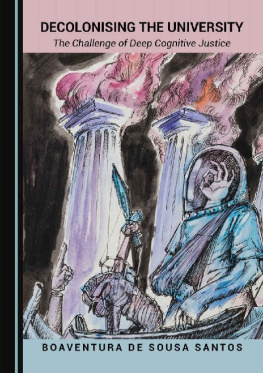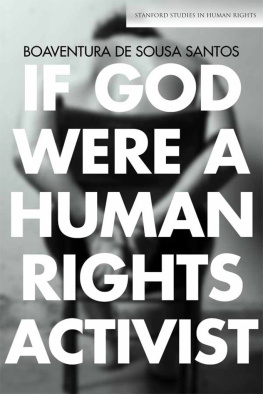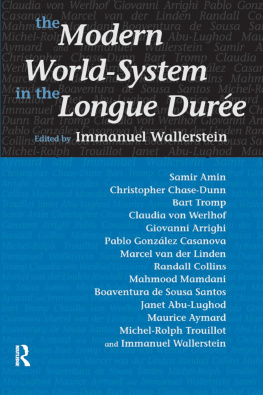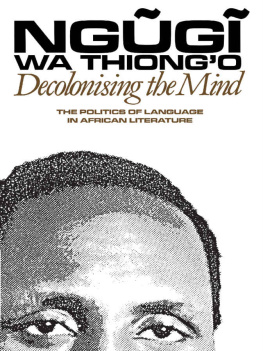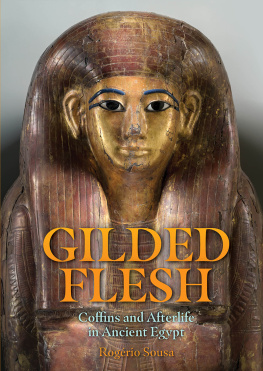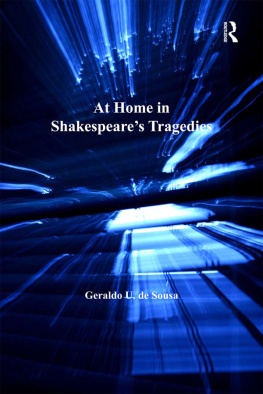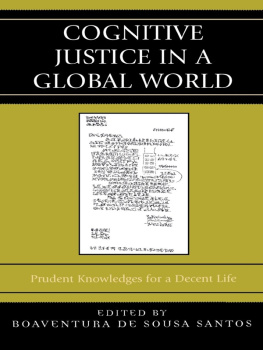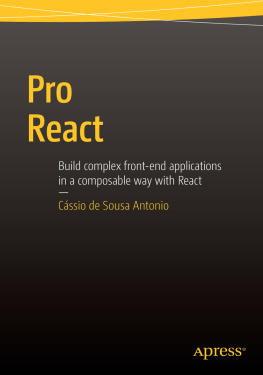Boaventura de Sousa Santos - Decolonising the University: The Challenge of Deep Cognitive Justice
Here you can read online Boaventura de Sousa Santos - Decolonising the University: The Challenge of Deep Cognitive Justice full text of the book (entire story) in english for free. Download pdf and epub, get meaning, cover and reviews about this ebook. year: 2017, publisher: Cambridge Scholars Publishing, genre: Romance novel. Description of the work, (preface) as well as reviews are available. Best literature library LitArk.com created for fans of good reading and offers a wide selection of genres:
Romance novel
Science fiction
Adventure
Detective
Science
History
Home and family
Prose
Art
Politics
Computer
Non-fiction
Religion
Business
Children
Humor
Choose a favorite category and find really read worthwhile books. Enjoy immersion in the world of imagination, feel the emotions of the characters or learn something new for yourself, make an fascinating discovery.
- Book:Decolonising the University: The Challenge of Deep Cognitive Justice
- Author:
- Publisher:Cambridge Scholars Publishing
- Genre:
- Year:2017
- Rating:5 / 5
- Favourites:Add to favourites
- Your mark:
- 100
- 1
- 2
- 3
- 4
- 5
Decolonising the University: The Challenge of Deep Cognitive Justice: summary, description and annotation
We offer to read an annotation, description, summary or preface (depends on what the author of the book "Decolonising the University: The Challenge of Deep Cognitive Justice" wrote himself). If you haven't found the necessary information about the book — write in the comments, we will try to find it.
Boaventura de Sousa Santos: author's other books
Who wrote Decolonising the University: The Challenge of Deep Cognitive Justice? Find out the surname, the name of the author of the book and a list of all author's works by series.
Decolonising the University: The Challenge of Deep Cognitive Justice — read online for free the complete book (whole text) full work
Below is the text of the book, divided by pages. System saving the place of the last page read, allows you to conveniently read the book "Decolonising the University: The Challenge of Deep Cognitive Justice" online for free, without having to search again every time where you left off. Put a bookmark, and you can go to the page where you finished reading at any time.
Font size:
Interval:
Bookmark:
Decolonisingthe University
Decolonising the University :
The Challenge of Deep Cognitive Justice
By
Boaventurade Sousa Santos

This book first published 2017
Cambridge Scholars Publishing
Lady Stephenson Library, Newcastle upon Tyne, NE62PA, UK
British Library Cataloguing in Publication Data
A catalogue record for this book is available fromthe British Library
Copyright 2017 by Boaventura de Sousa Santos
All rights for this book reserved. No part of thisbook may be reproduced, stored in a retrieval system, or transmitted, in anyform or by any means, electronic, mechanical, photocopying, recording orotherwise, without the prior permission of the copyright owner.
ISBN(10): 1-5275-0003-9
ISBN(13): 978-1-5275-0003-7
Table of Contents
Preface
The university is one of the institutions thathas most resisted the erosion of time, no doubt because over the course of the yearsits institutional structure has undergone deep changes. There is today very littlein common between the oldest universities, the University of Timbuktu (a city intodays Mali, West Africa) founded in 982 CE and attended, throughout the 12th century,by about 25,000 students, or Al-Azhar University, founded in Cairo in 970 CE andsupervising today a network of institutions with two million students; the mainmedieval European universities: Bologna founded in 1088, Oxford, ca. 1096, Sorbonne,1150, Salamanca, 1218, Coimbra, 1290; and Paris Napoleonic University, 1808 andHumboldt University, Berlin 1811, the latter two being universities models thatspread throughout Europe, the Americas, and the whole world in the last two centuries.What all of them had in common at the outset was the drive to develop advanced studiesand form elites, whether religious, political, cultural, or scientific.
Conceiving of the present as historical present,the question confronting us here concerns the nature and dynamics of the transformationthat the university is undergoing today. I argue in this book that, for the past40 years, the university has been undergoing a process of paradigmatic change towhich both external and internal factors contribute. This is a time when everythingis open-ended. The projects proposing change are so contradictory that, dependingon the evolution of the conflicts they generate, the question about the future ofthe university may well turn into the question of whether the university has a future.In this context, if the objective is to guarantee the future of the university,resistance to certain kinds of change may not be a negative factor.
The Western-centricmodern university was entrusted with preparing (in technical, scientific and cultural terms) modern solutions for the modern problems, solutions which, after the French Revolution, were formulated as the fulfillmentof the revolutions ideals of libert, egalit,fraternit. Rightat the start, the envisaged solutions comprised a vast field of social innovation,expanding even more as time went by. The abyssal line that divides Western thinkingis representative of a way of thinking premised upon the abyssal line separatingmetropolitan sociability from colonial sociability, and proclaiming supposedly universalprinciples which in practice only apply to the metropolitan side of the abyssalline. Given this schism exists, such innovation, even though formulated in generalterms, was to be carried out on this side of the abyssal line alone, that is tosay, in the metropolitan societies.
The litany of themenu of solutions is known, but let us mention those in which the university wasmost specifically involved: scientific and technological progress; formal and instrumentalrationality; the precedence of the ideas of utility, calculability and representationover those of curiosity, passion, emotion, reflexivity; the individual, not thecollective as the primary unit of society; choice and power, rather than birth andfatalism as determining social life; the modern, bureaucratic state; constitutionalgovernment; secularism in the state, laicism in society; individual identity asa matter of choice and achievement and collective identity as national identity;culture and society as emerging, not from nature, but against and in rupture withnature; domination of nature as human emancipation; progress as infinite and lineardevelopment of productive forces, both material and spiritual; childhood and youthas stages preparing for life; work separated from family and community; the institutionalisationof social conflict raised by social divisions through liberal democratic processes.
The modern university,particularly from mid-19th century onwards, has been a key componentof such solutions. It was actually in light of them that institutional autonomy,academic freedom, and social responsibility were originally designed. The generalisedcrisis of the modern equation of modern solutions for modern problems is today soevident that we can safely say: if we still choose to formulate our problems inthe modern Western way, we are bound to conclude that we face modern problems forwhich there are no modern solutions. The crisis of the modern Western equation hasthereby brought with itself the crisis of the university. The high period of universitydevelopment took place after WWII, till the 1970s- a period of intense reformistimpulses worldwide. In most cases, the student movements of the late 1960s to early1970s were the force behind them. In the past 30 years, however, for different butconvergent reasons, in various parts of the world the university has becomeratherthan a solution for societal problemsan additional problem.
As far as the universityis concerned, the problem may be formulated in this way: the university is beingconfronted with paradigmatic questions for which it has so far provided only sub-paradigmaticanswers. Paradigmatic questions are those questions which go to the roots of thehistorical identity and vocation of the university, in order to question not somuch the details of the future of the university, but rather whether the university,as we know it, indeed has a future at all. They are, therefore, questions that rousea particular kind of perplexity. Sub-paradigmatic answers take the future of theuniversity for granted. The reforms they call for end up being an invitation toimmobilism. They fail to abate the perplexity caused by the paradigmatic questionsand may, in fact, even increase it. Indeed, they assume that the perplexity is pointless.
In this book, I submitthat we must take up the paradigmatic questions and transform the perplexity theycause into a positive energy, both to deepen and to reorient the reformist movement.The perplexity results from the fact that we are before an open field of contradictionsin which there is an unfinished and unregulated competition among different possibilities.Such possibilities open up space for political and institutional innovation, byshowing the magnitude of what is at stake.
As I said, theseare paradigmatic questions for which the public university has so far provided onlysub-paradigmatic answers. There is, however, a dovetailed problem with this assertion:The first one is that it assumes as a given the existence of an entity with somegeneral characteristics called the university which is identically presentall over the globe. Such a name does exist but the realities it covers are so diversefrom country to country, and within the same country, that any generalisation maybecome abusive. The second problem is that focusing on general answers to be givenby the university as a general type of educational institution may lead us toignore the highly creative and very paradigmatic answers that specific universitiesin specific countries are providing, as well as those that are emerging in the shadowof the university. Focusing on the absent university may mislead us into ignoringthe emergent university.
Font size:
Interval:
Bookmark:
Similar books «Decolonising the University: The Challenge of Deep Cognitive Justice»
Look at similar books to Decolonising the University: The Challenge of Deep Cognitive Justice. We have selected literature similar in name and meaning in the hope of providing readers with more options to find new, interesting, not yet read works.
Discussion, reviews of the book Decolonising the University: The Challenge of Deep Cognitive Justice and just readers' own opinions. Leave your comments, write what you think about the work, its meaning or the main characters. Specify what exactly you liked and what you didn't like, and why you think so.

